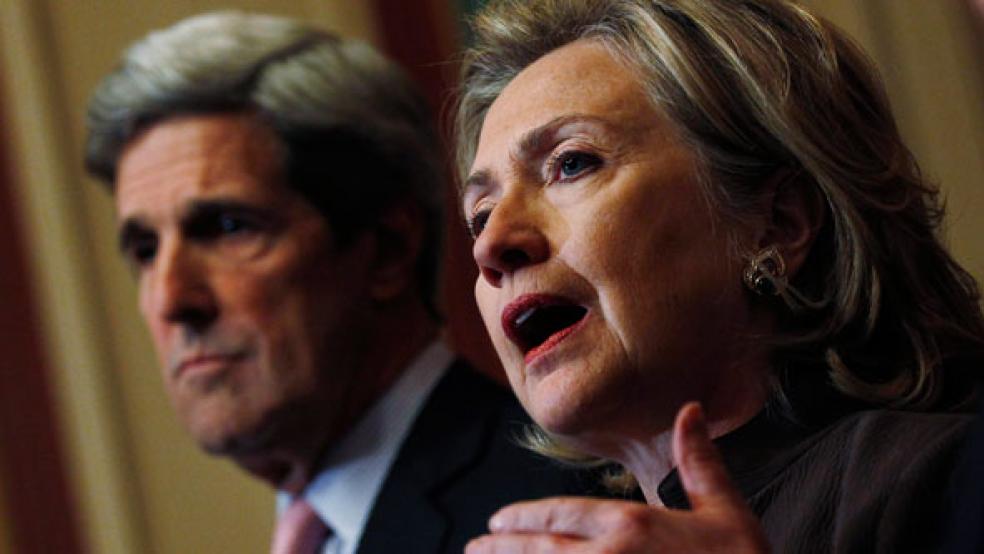Politics – and history – are beset by mythology. In the netherworld of America’s political subconscious, John F. Kennedy had nothing to do with starting the Vietnam War; Reagan never backed down from terrorism, least of all in Beirut; and the Cold War was fought by a remarkably amicable bipartisan consensus, with few arguments over missile defense, missile gaps, China, Vietnam, Chile, Nicaragua, Douglas MacArthur, or anything else.
These myths are unhelpful - not because they give credit where none is due, but because they prevent us from learning the right lessons from history. So in advance of Hillary Clinton’s formal campaign for president, let us put this one to bed right now: The Obama administration’s Russia reset never worked. Ever.
Related: EU Moves Toward Limited Sanctions Against Russia
It’s important to remember this, because Hillary’s campaign has to rest (at least partially) on the myth of her success with the State Department, which itself has to rest (more than partially) on the myth of her success with Russia. The Russia reset was the highest-profile element of her time running American diplomacy, and thus is central to her narrative. And it is currently looking like a catastrophe, and she knows it.
On Sunday, July 27th, Hillary Clinton went on CNN to continue creating a new myth, arguing (as she did in her book) that the reset of relations with Russia worked for a time. As evidence, she points to two major achievements: the New Strategic Arms Reduction Treaty (START), ratified in 2011, and the 2010 UN Security Council resolution (UNSCR) on Iran.
At its core, the reset was always fairly cold-blooded. In exchange for America conceding a certain droit de seigneur to Russia in Eastern Europe and the former Soviet Union, as well as soft-walking its often-controversial approach to democratic transition, Russia would help stop Iran’s nuclear program. And hopefully a few other things.
The Obama administration kept its end of the bargain. It scrapped the proposed missile defense sites in Poland and the Czech Republic, deeply embarrassing their governments. It also sidelined pushing for Georgia’s NATO membership, particularly galling to a new democracy that had sent a significant number of combat troops to Iraq and Afghanistan and had actually been invaded by Russia five months earlier. In exchange, Russia supported another sanctions resolution by the United Nations Security Council on Iran. The fourth.
Related: What the U.S. Can Do Now to Punish Russia
That’s the first catch to the historiography of the reset: Russia was already cooperating on Iran. To be sure, the June 2010 UNSCR resolution was tougher than the three before it; but then, each of those three had been tougher than the ones before it, also. UNSCR 1737, which prohibited the supply of nuclear enrichment and weapons-related technology to Iran, had been passed in December 2006 with Russian support. That support was helped along by a last-minute phone call between the great un-diplomat George Bush and the great post-diplomat, Vladimir Putin, in an unheralded burst of multilateralism.
UNSCR 1737 was followed closely by UNSCR 1747 four months later, which restricted arms sales with Iran and expanded the list of individuals subject to sanctions. Russia also voted for this resolution. A year later, the UN Security Council passed a third sanctions resolution, UNSCR 1803, that further expanded the financial sanctions and travel bans against Iranian personnel. Russia supported that one as well.
The Obama administration’s contribution came in June 2010 with UNSCR 1929. Like its predecessors, UNSCR 1929 was the strongest resolution to date, expanding prohibitions on weapons sales, prohibiting cooperation on most ballistic missiles, and sanctioning certain entities linked to the Islamic Revolutionary Guard Corps, which essentially manages Iran’s nuclear program. Russia, as it had for the previous three rounds of UNSC sanctions, voted in favor.
The administration’s prize pig, UNSCR 1929, was a diplomatic success. But it was not disproportionately more severe than the steadily escalating UN sanctions achieved by the Bush administration – and U.S. concessions certainly were. In particular, President Bush had achieved prior resolutions without giving Putin a free hand among America’s wartime allies. And since the real bite on Iran’s economy came through independent U.S.-EU sanctions, the administration could have sacrificed less for an even more watered-down UN resolution and still instituted effective independent sanctions with Europe.
Related: How Putin Awoke NATO's Sleeping Giant
Which brings us to the other leg of Hillary’s achievement dyad: the New START agreement. Without wading into an agreeably retro discussion of nuclear mega tonnage, throw weight, and strategic triads, we should remember one important point: The Russians needed START more than we did.
Why? Prestige. Remember, by virtual any measure of power – economic, military, diplomatic, etc – the United States ranks at or near the top of the world. But Russia’s entire claim to great-power status rests on its vast arsenal of nuclear weapons. It’s also much poorer than the United States, and upkeep of those weapons is thus relatively more of a burden. To reduce them unilaterally simply weakens Russia’s claim to global significance; but to do so through a great-power agreement with the U.S. not only maintains its relative nuclear prominence (and thus status) more cheaply, but lets Moscow negotiate with Washington on the high stage. It gets the same prestige for half the price, and a nice signing ceremony to boot.
It is absolutely not wrong to pursue a nuclear reduction treaty that Russia wants. But it is absolutely wrong to do so without extracting explicit concessions in other areas. START wasn’t a relative benefit to us: It was a relative benefit to them. So please, Hillary: stop treating it – and Iran – like major victories.
Top Reads from The Fiscal Times:






